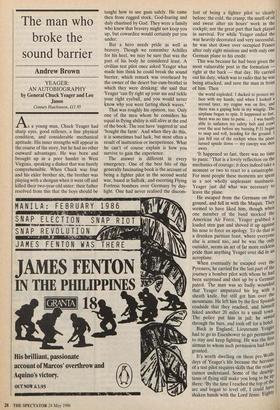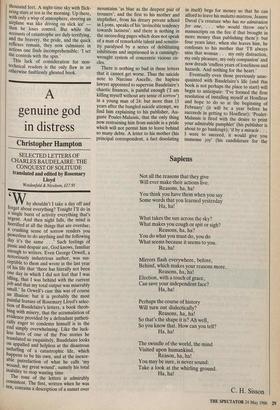The man who broke the sound barrier
Andrew Brown
YEAGER: AN AUTOBIOGRAPHY by General Chuck Yeager and Leo Janos
Century Hutchinson, £11.95
As a young man, Chuck Yeager had sharp eyes, good reflexes, a fine physical condition, and considerable mechanical aptitude. His inner strengths will appear in the course of the story, but he had no other outward advantages. He was born and brought up in a poor hamlet in West Virginia, speaking a dialect that was barely comprehensible. When Chuck was four and his elder brother six, the brother was playing with a shotgun when it went off and killed their two-year-old sister: their father resolved from this that the boys should be taught how to use guns safely. He came then from rugged stock, God-fearing and duly chastised by God. They were a family who knew that bravery might not keep you up, but cowardice would certainly put you under.
But a hero needs pride as well as bravery. Though we remember Achilles for his heel, we may be sure that was the part of his body he considered least. A civilian test pilot once asked Yeager what made him think he could break the sound barrier, which remark was overheard by the owner of the desert bar-cum-brothel in which they were drinking: she said that Yeager 'can fly right up your ass and tickle your right eyeball, and you would never know why you were farting shock waves.'
That was roughly his opinion, too. Only one of the men whom he considers his equal in flying ability is still alive at the end of the book. The rest have `augered in' and `bought the farm'. And when they do this, it is sometimes bad luck, but most often a result of inattention or inexperience. What he can't of course explain is how you survive to gain the experience.
The answer is different in every emergency. One of the best bits of this generally fascinating book is the account of being a fighter pilot in the second world war, based in Suffolk, and escorting Flying Fortress bombers over Germany by day- light. One had never realised the discom- fort of being a fighter pilot so clearly before: the cold, the cramp, the smell of oil and sweat after six hours' work in the cockpit; nor the great part that luck played in survival. For while Yeager ended the war heavily decorated and very successful, he was shot down over occupied France after only eight missions and with only one German plane to his credit.
This was because he had been given the most vulnerable post in the formation right at the back — that day. He carried out his duty, which was to radio that he was being attacked, and save the man in front of him. Then the world exploded. I ducked to protect my face with my hands, and when I looked a second later, my engine was on fire, and there was a gaping hole in my wingtip. The airplane began to spin. It happened so fast, there was no time to panic . . I was barely able to unfasten my safety belt and crawl over the seat before my burning P-51 began to snap and roll, heading for the ground. I just fell out of the cockpit when the plane turned upside down — my canopy was shot away.
`It happened so fast, there was no time to panic.' That is a lovely reflection on the mechanics of courage: it does indeed take a moment or two to react to a catastrophe. For most people these moments are spent in a not wholly unpleasant numbness. Yeager just did what was necessary to leave the plane.
He escaped from the Germans on the ground, and fell in with the Maquis. They seemed to have liked him, though when one member of the band mocked the American Air Force, Yeager grabbed a loaded sten gun and shoved it up against his nose to force an apology. To do that at a drunken partisan feast, where everyone else is armed too, and he was the only outsider, seems an act of far more reckless pride than anything Yeager ever did in an aeroplane. When eventually he escaped over the Pyrenees, he carried for the last part of the journey a bomber pilot with whom he had been surprised and shot up by a German patrol. The man was so badly wounded that Yeager amputated his leg with a sheath knife, but still got him over the mountains. He left him by the first Spanish roadside that they reached, and himself hiked another 20 miles to a small town. The police put him in jail; he sawed through the bars, and took off for a hotel. Back in England, Lieutenant Yeager had to go to Eisenhower to get permission to stay and keep fighting. He was the first airman to whom such permission had been granted. It's worth dwelling on these pre-Wolfe days of Yeager's life because the heroism of a test pilot requires skills that the reader cannot understand. Some of the descrip- tions of flying still make you long to be UP there: 'By the time I reached the top of the arc and began to level off, I could have shaken hands with the Lord Jesus. Eighty thousand feet. A night-time sky with flick- ering stars at ten in the morning. Up there, with only a wisp of atmosphere, steering an airplane was like driving on slick ice' then he loses control. But while the accounts of catastrophe are duly terrifying, and the bravery, the pride, and the quick reflexes remain, they now culminate in actions one finds incomprehensible: 'I set the controls with the spin.'
This lack of consideration for non- technical readers is the only flaw in an otherwise faultlessly ghosted book.















































 Previous page
Previous page